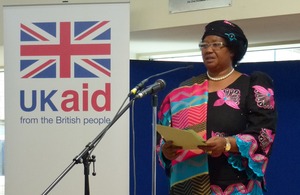New support to tackle HIV and AIDS in Malawi
UK to provide additional support to tackle HIV and AIDS in Malawi, as well as support for wider healthcare

President Joyce Banda speaking today at DFID. Picture: Jane Garvan/DFID
The UK will provide additional support to tackle HIV and AIDS in Malawi, as well as support for wider healthcare, Development Secretary Justine Greening announced today (18 March 2013), as she welcomed Malawian President Joyce Banda to DFID’s Scottish headquarters in East Kilbride to discuss UK-Malawi development cooperation.
The new UK package of £21 million will go towards work to help reduce new HIV infections in Malawi. 164,000 couples will undertake joint counselling and testing for HIV, 17,000 pregnant women will be counselled and tested for HIV and 23.1 million condoms will be distributed.
This is in addition to UK support of £16 million to provide essential drugs and commodities such as antibiotics, painkillers and bandages for central hospitals and district health centres. The first shipment is expected to arrive in Malawi in the next few weeks.
Speaking during the visit, Justine Greening said:
“I would like to congratulate President Banda on the continuing process of reform that she started when she took power in Malawi. After last week’s historic agreement on the Commission for the Status of Women and Girls, the recent Gender Bill in Malawi which pushes forward rights on sexual and reproductive health is great news for women and girls.”
“The UK is ready to support the people of Malawi as the country moves towards economic stability and prosperity, and has shown its commitment with a package of support to ensure that HIV infection is reduced and that hospitals and medical centres are equipped with essential drugs and other items.”
Over the last year the UK has provided development support of around £115 million to Malawi, and is one of the largest donors to the country. This support focuses primarily on health, education and agriculture, with further funding for governance, accountability and private sector development as well as responding to humanitarian emergencies, such as the current food crisis.